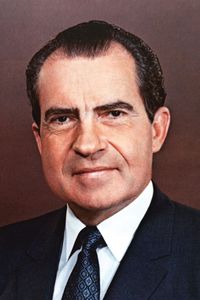Richard Milhous Nixon, the 37th President of the United States, occupied the White House from 1969 to 1974, leaving an indelible mark on the nation's history.
Initially, he served as a representative and senator from California, a career that ultimately led him to assume the role of the 36th Vice President of the United States from 1953 to 1961, under the presidency of Dwight D. Eisenhower.
During his five-year tenure as President, Nixon's administration was characterized by a significant reduction of U.S. involvement in the Vietnam War, which had been a contentious issue for several years prior. Additionally, he pursued a policy of detente with the Soviet Union and China, two nations with whom the United States had previously been at odds.
Nixon's presidency also witnessed the historic achievement of the first manned Moon landings, a feat that captured the imagination of the global community and cemented the United States' position as a leader in space exploration.
Furthermore, his administration established two crucial government agencies: the Environmental Protection Agency (EPA) and the Occupational Safety and Health Administration (OSHA),which aimed to protect the nation's natural resources and ensure a safer working environment for its citizens.
However, Nixon's second term was cut short, as he became the only President in U.S. history to resign from office, effective on August 9, 1974. This decision was precipitated by the Watergate scandal, a political crisis that arose from the break-in at the Democratic National Committee headquarters at the Watergate complex in Washington, D.C.





















































































































































